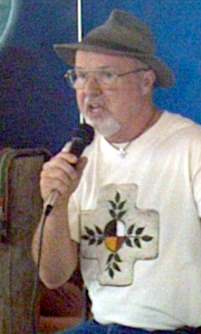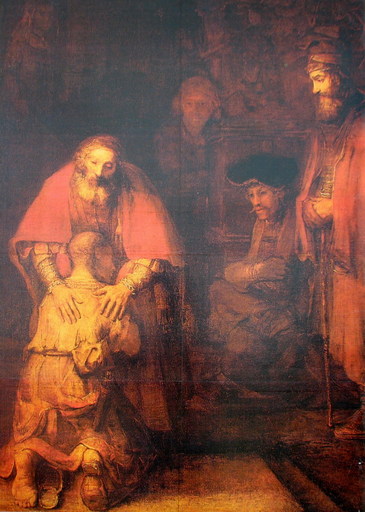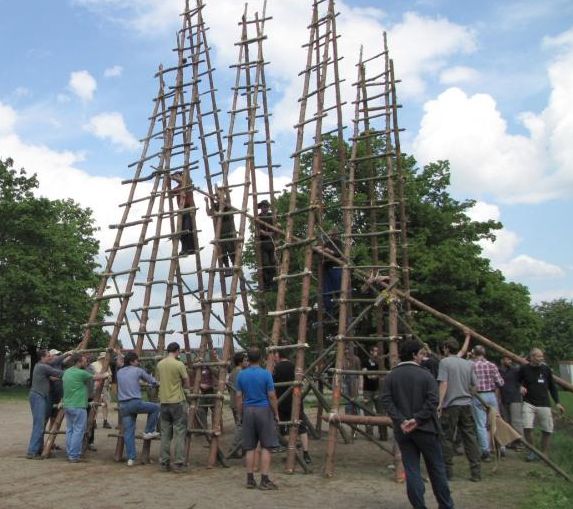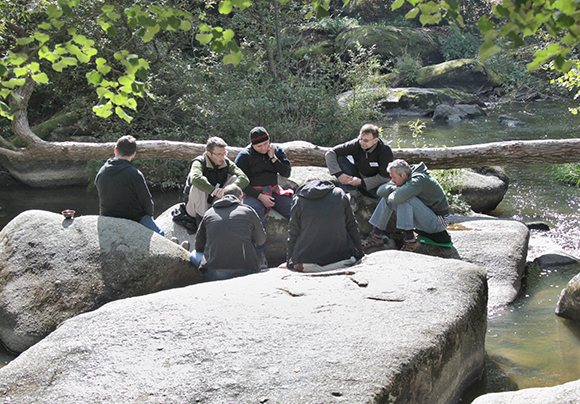
Starý muž, který se neumí smát, je trouba.
Richard Rohr
Kdo jsme?
Tento web reprezentuje hnutí Chlapi, neformální společenství mužů, kteří hledají takové způsoby duchovního prožívání, se kterými se dokážou jako muži ztotožnit a celou bytostí je žít.
Můžeš se tady setkat s muži, kteří usilují o to být lepšími a více autentickými.
Vytváříme jak reálný tak virtuální prostor pro setkávání.
Začalo to někdy před rokem 2000 hledáním mužské energie, spirituality i chlapské party a setkáváním v malých skupinách. Pokračovalo to inspirací dílem Richarda Rohra a jeho Rituálem pro přechod do zralé dospělosti a pokračuje to dodnes stovkami setkání v malých skupinách, víkendovými akcemi pro muže i pro otce a děti, rituály i celostátními setkáními pro stovky účastníků a mezinárodní spoluprací s hnutím mužů po celém světě.
Pro řadu z nás je podstatné přátelství s Bohem, pro všechny jsou oporou kamarádi, které tu nalezli.
Vítáme tě mezi námi a těšíme se na společné putování.

Pavel Hrdina a Martin Šmídek
Překlad meditace CAC z úterý 20. 5. 2025
na téma:
Tříkolka víry
| Výklad Písma prostřednictvím zkušenosti Autoři a aktivisté Alexia Salvatierra a Brandon Wrencher popisují, jak zotročení Afričané interpretovali Bibli prostřednictvím svých zkušeností a našli v ní příslib důstojnosti a osvobození. Díky tomu, že v biblických příbězích viděli sami sebe ... se zotročení Afričané zabývali Biblí jako živým textem. Byli ve vztahu s Biblí, rozmlouvali s jejími příběhy a jejím Bohem. Boha nevnímali jako vzdálené, zlovolné božstvo. Bůh zotročených Afričanů byl všudypřítomný, vysvobozoval je a trestal jejich utlačovatele. Boží společnost se projevovala zejména v tom, jak zotročení Afričané interpretovali Ježíše, kterého vnímali jako přítele, jenž s nimi putuje za přežitím a osvobozením z útlaku. Spirituál "Chci, aby Ježíš kráčel se mnou" zobrazuje hluboké přátelství, které zotročení lidé s Ježíšem měli: Chci, aby Ježíš kráčel se mnou Zotročení Afričané prokázali svou houževnatost a inovativnost při vytváření lidové teologie z Bible v podobě lidových písní zvaných černošské spirituály. Spirituály zpívali jak v tichých přístavištích v poušti, tak v mystických tichých přístavištích svých duší při práci na polích a na plantážích. Spirituály jim umožnily přenést biblické příběhy do média, které je učinilo živými, tělesnými, a tedy vlastními. A zotročeným Afričanům umožnily nabídnout nové kreativní interpretace biblických příběhů. Příběh Exodu o svobodě promlouval mocným a specifickým způsobem ke zkušenosti zotročených: V příběhu o exodu získal Mojžíš od Boha moc rozdělit moře a umožnit tak hebrejskému lidu, který vedl, útěk před jeho utlačovateli, faraonem a Egypťany. Moře se na faraona a jeho armádu, kteří pronásledovali hebrejský lid, sesulo a utopilo je. Hebrejský lid byl s Boží pomocí osvobozen. V souladu s radikální interpretací biblických příběhů zotročení Afričané vplétali do biblického příběhu své vlastní podmínky prostřednictvím písní.... Jednoho z těchto rán, jasných a krásných Poselství je jasné: stejně jako Bůh dal vítězství Hebrejcům nad Egyptem a Ježíši a církvi nad Římem, dá Bůh vítězství zotročeným Afričanům nad jejich otroctvím bílé křesťanské americké tyranii. A toto vítězství, stejně jako vítězství, které Bůh dal Hebrejcům a Ježíši a učedníkům, se neodehraje ve "sladkém budoucím", ale v současném světě. Zotročení Afričané věřili, že Bůh bude působit skrze ně, aby toto osvobození přinesl. Fr. Richard Rohr, OFM přeloženo DeepL | Interpreting Scripture Through Experience
Authors and activists Alexia Salvatierra and Brandon Wrencher describe how enslaved Africans interpreted the Bible through their experience and found a promise of dignity and liberation. By seeing themselves in biblical stories … enslaved Africans engaged the Bible as a living text. They were in relationship with the Bible, talking back to its stories and its God. God was not seen as a distant, malevolent deity. The God of enslaved Africans was ever-present, would deliver them, and would punish their oppressors. The companionship of God was seen especially in how enslaved Africans interpreted Jesus, whom they saw as a friend on the journey with them to survive and be liberated from their oppression. The Spiritual “I Want Jesus to Walk with Me” depicts the deep friendship the enslaved had with Jesus: I want Jesus to walk with me Enslaved Africans demonstrated their resilience and innovation in crafting a folk theology from the Bible in the form of folk songs called Negro Spirituals. They sang the Spirituals in both the hush harbors in the wilderness and the mystical hush harbors of their souls while in the fields and on the plantation. The Spirituals allowed them to put biblical stories in a medium that made them alive, bodily, and thus their own. And it allowed enslaved Africans to offer creative new interpretations of biblical stories. The Exodus story of freedom spoke in a powerful and particular way to the experience of the enslaved: In the exodus story, Moses gained power from God to part a sea, allowing the Hebrew people he was leading to escape from their oppressors, Pharaoh and the Egyptians. The sea collapsed on and drowned Pharaoh and his army as they chased the Hebrew people. The Hebrew people were set free with God’s help. In step with their radical interpretation of biblical stories, enslaved Africans would weave their own conditions into the biblical story through song…. One of these mornings, bright and fair The message is clear: in the same way that God gave victory to the Hebrews over Egypt and to Jesus and the church over Rome, God will give victory to enslaved Africans over their bondage to white Christian American tyranny. And this victory, just like the victory God gave the Hebrews and Jesus and the disciples, will not be in “the sweet by and by” but in the present world. Enslaved Africans believed God would work through them to bring this deliverance. Fr. Richard Rohr, OFM |
[1] Traditional, “I Want Jesus to Walk with Me.” See Lift Every Voice and Sing II: An African American Hymnal (Church Publishing, 1993), no. 70.
[2] Traditional, “O Mary Don’t You Weep.” See This Far by Faith: An African American Resource for Worship (Augsburg Fortress, 1999), no. 88.
Alexia Salvatierra and Brandon Wrencher, Buried Seeds: Learning from the Vibrant Resilience of Marginalized Christian Communities (Baker Academic, 2022), 37–38.
Zde se nacházejí překlady Daily Meditations, jejichž anglické originály se nacházejí na webu CAC. V den jejich vydání je zde nalezneš přeložené strojově pomocí DeepL, zpravidla do druhého dne pak projdou jazykovou úpravou někým z týmu překladatelů :-) Pokud vládneš dobrou angličtinou, přihlas se asi raději přímo u zdroje těchto úvah, tedy na webu CAC. Budeš je pak do své mailové schránky dostávat již k ranní kávě. -mš-
 Myšlenka Richarda Rohra na úterý čtvrtého týdne v mezidobí - Síla evangelia Slovo, kterým Bůh promlouvá, je slovem opravdové síly, ale my tomu nevěříme. Je to naopak naše vlastní síla, v niž věříme, že promění svět. Ale co z ní vzešlo? Jen se podívejme třeba na svou vládu! Anebo na svět! Co je to za bídnou kulturu, za nicotnou civilizaci, které svět svými silami dosáhl. Jak málo lidství! Konzervativci mají sklon nedůvěřovat bezmoci, zatímco …
Myšlenka Richarda Rohra na úterý čtvrtého týdne v mezidobí - Síla evangelia Slovo, kterým Bůh promlouvá, je slovem opravdové síly, ale my tomu nevěříme. Je to naopak naše vlastní síla, v niž věříme, že promění svět. Ale co z ní vzešlo? Jen se podívejme třeba na svou vládu! Anebo na svět! Co je to za bídnou kulturu, za nicotnou civilizaci, které svět svými silami dosáhl. Jak málo lidství! Konzervativci mají sklon nedůvěřovat bezmoci, zatímco …




